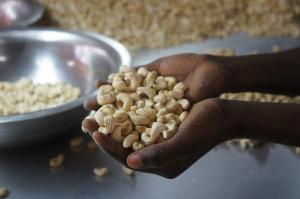When Money Really Does Grow on Trees: The Rise of the Cashew Industry in Ghana
Though only a little larger than a one cedi coin, the cashew nut has the potential to be economic dynamite in Ghana, and it’s just beginning to spark. Over the last couple of years, cashew production in Ghana has grown at a rapid pace. This increase within Ghana is part of a larger trend throughout Africa, as cashew production has nearly doubled on the continent over the last 10 years. Now, over two million African farmers grow about 48% of the world’s cashew, slowly replacing previous hubs for the nut, such as Vietnam and India. As cashew nut production rises throughout Africa, the benefits span far beyond enjoying more of the delicious, bite-size snack. The cashew industry provides livelihoods for many and economic benefits for many more.
The Value Chain
Every cashew nut that reaches the market  " width=
" width=
goes through a lengthy process of growth, transport, and processing: at each stop along the way, the small seed gains value. In the first stage, farmers plant and nurture wide, leafy trees that will eventually produce red, orange, and yellow fruits, visual relatives of bell-peppers in the vegetable family. While sweet and flavorful in their own right, these cashew apples are often forgotten once the tree’s seed forms in a brown kidney-shaped casing at the bottom – the cashew nut.
Once the farmers pick the fruit and nut from the tree, the cashews are transported to stage two of the value chain: processing. For 93%-95% of cashews, this transport will be long, as they are transported out of Africa to be processed. Once they are sent off the continent, the value chain in Africa ends, and the extra worth added to raw cashew nuts in processing benefits international companies. For the other 5%-7% of raw cashew nuts that are taken from African farms, the transport to the second stage is short, and the value which will soon be added benefits African laborers and consequentially the economy.
At the processing factory, cashews are dried, peeled, roasted, and packaged; Prepared for the final stage of consumption. From farmer to consumer, the cashew market is mobilized by buyers, processors, transporters, and retailers. Each actor along the line gives and takes value from the small nut.
Small Nut, Big Impact
The size of the cashew industry in Ghana, as a fraction of the country’s total economy will probably surprise you. Exports of the small, moon-shaped seed of the cashew tree account for 6% of Ghana’s total GDP, and 18% of the country’s agricultural GDP. Behind the data and percentages, about 60,000 small holder farmers are fueling cashew production everyday in Ghana on 60,000 total hectares of land. In total, Ghana produced over 50,000MT of raw cashew nuts in the year 2012. Ghana also acts as a hub for cashew trade and export, often exporting cashew from neighboring countries including Cote d’Ivoire and Burkina Faso. Consequentially, Ghana exported 180,000MT of RCN in 2012, over 150% of it’s national cashew production.
 As processing continues to grow throughout Africa, and in Ghana, the cashew is gaining an even more prominent place in national economies. Currently, Ghana has an installed processing capacity of 18,000MT, however a new large processing plant will increase this capacity by 35,000MT when it begins operation next year. This increase in processing capacity will make Ghana the leading country in Africa, in terms of processing capacity. This means a longer value chain within Ghana and therefore more gains.
As processing continues to grow throughout Africa, and in Ghana, the cashew is gaining an even more prominent place in national economies. Currently, Ghana has an installed processing capacity of 18,000MT, however a new large processing plant will increase this capacity by 35,000MT when it begins operation next year. This increase in processing capacity will make Ghana the leading country in Africa, in terms of processing capacity. This means a longer value chain within Ghana and therefore more gains.
Every dollar that is spent directly on Ghana’s dynamic cashew industry sparks economic gains that echo far beyond cashew farmers and processors. A study completed by the United States Agency for International Development and the West African Trade Hub found that for every $1000 in cashew sales by farmers, 120 jobs were created in the central Ghana. That is 120 opportunities, 120 livelihoods, and that $1000 dollars in cashew sales happened hundreds of thousands of times in Ghana, last year alone. As expected, such large impacts on labor also impact income levels. The same study found that for every $1.00 in farm income from the sale of cashews, an additional $1.43 of household income was created in the local economy. Dynamite.


